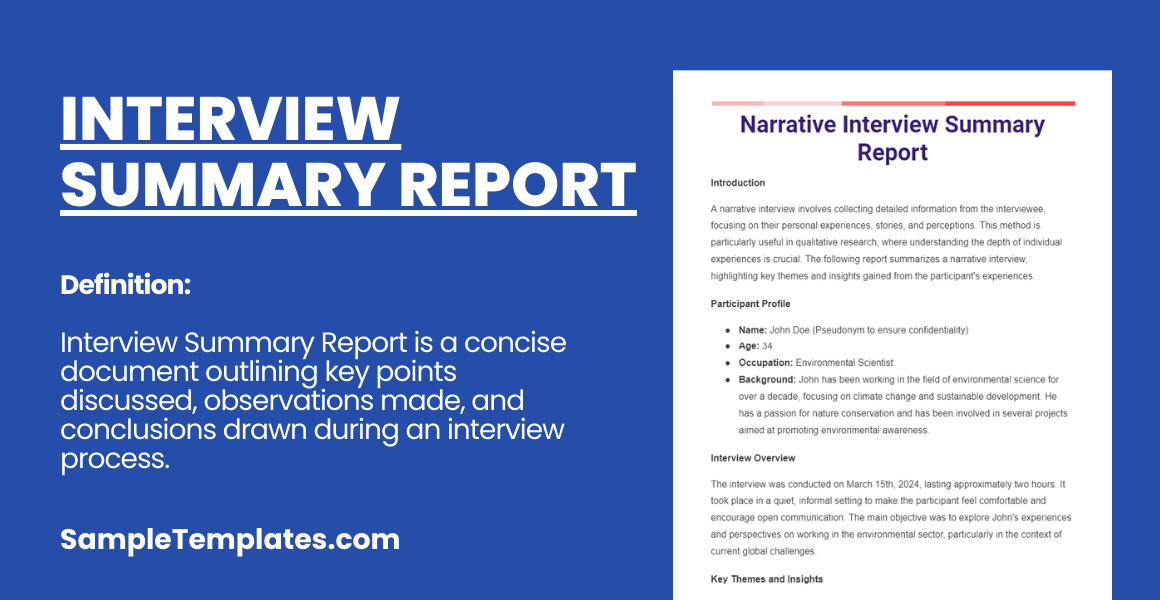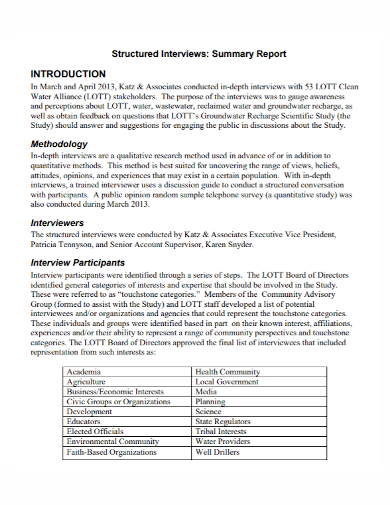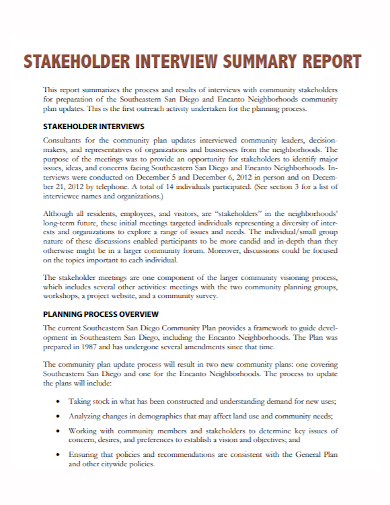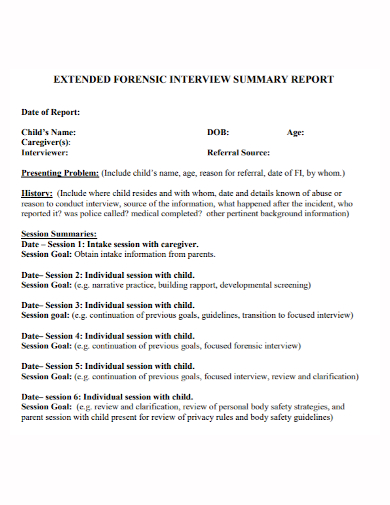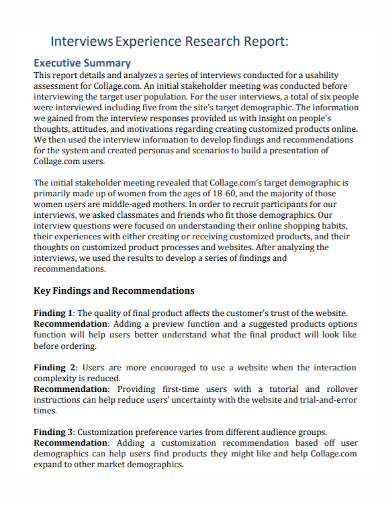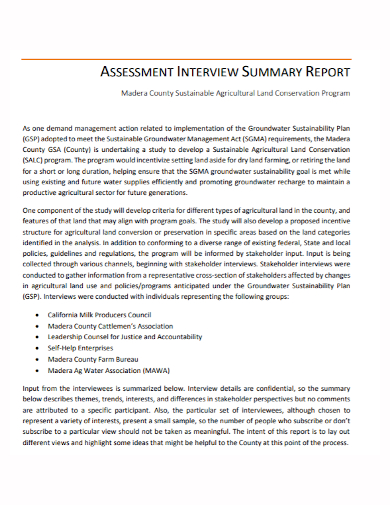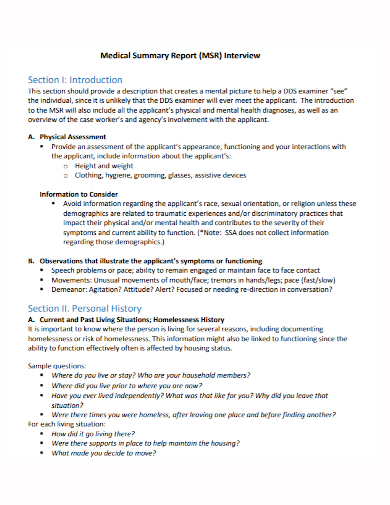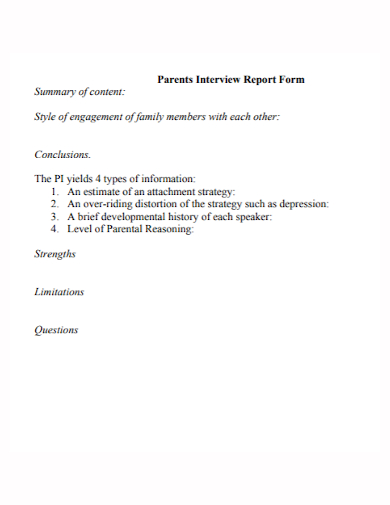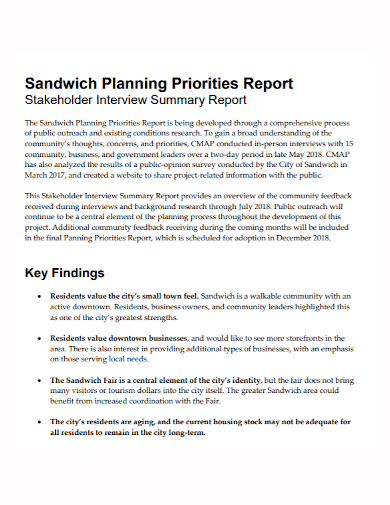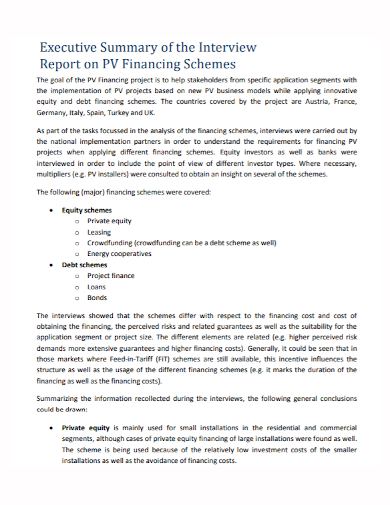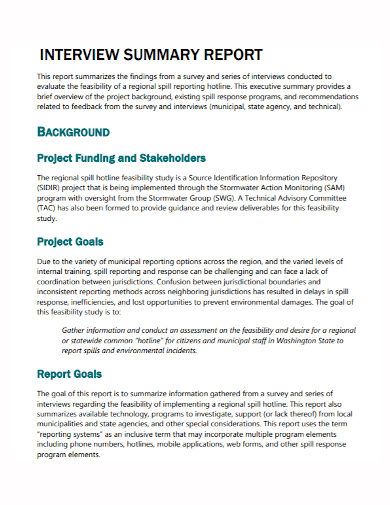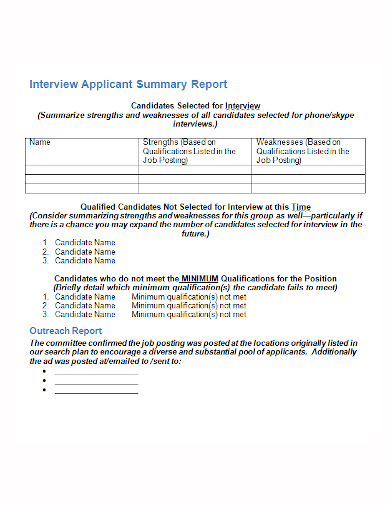Interviews are normally conducted if we want to gather information about the interviewee, or to talk about something he or she is familiar of. There are various types of interviews such as job interviews, exit interview, group interviews, research interview to name a few. Information from these interviews are then summarize in what we call a interview summary report. Learn more about this as you read along our article and for free templates you may want to check out our free interview summary report samples below:
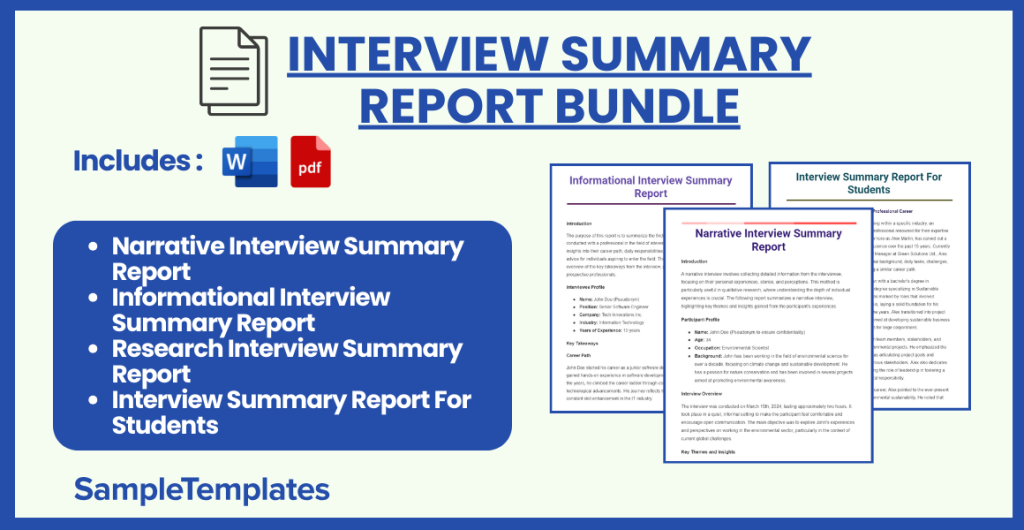
Download Interview Summary Report Bundle
Narrative Interview Summary Report
Introduction
A narrative interview involves collecting detailed information from the interviewee, focusing on their personal experiences, stories, and perceptions. This method is particularly useful in qualitative research, where understanding the depth of individual experiences is crucial. The following report summarizes a narrative interview, highlighting key themes and insights gained from the participant’s experiences.
Participant Profile
- Name: John Doe (Pseudonym to ensure confidentiality)
- Age: 34
- Occupation: Environmental Scientist
- Background: John has been working in the field of environmental science for over a decade, focusing on climate change and sustainable development. He has a passion for nature conservation and has been involved in several projects aimed at promoting environmental awareness.
Interview Overview
The interview was conducted on March 15th, 2024, lasting approximately two hours. It took place in a quiet, informal setting to make the participant feel comfortable and encourage open communication. The main objective was to explore John’s experiences and perspectives on working in the environmental sector, particularly in the context of current global challenges.
Key Themes and Insights
- Passion for the Environment:
- John’s love for nature began in childhood, largely influenced by family camping trips. This early exposure sparked a lifelong commitment to environmental conservation.
- Challenges in the Field:
- He discussed various obstacles, including political resistance, public skepticism, and funding shortages. Despite these challenges, John remains optimistic about making a significant impact.
- Success Stories:
- John highlighted several successful projects, including a community-based recycling program and a campaign to protect local wildlife. These initiatives have strengthened his belief in collective action for environmental protection.
- Personal Growth:
- Working in environmental science has not only been a professional journey for John but also a personal one. He emphasized how tackling complex environmental issues has enriched his problem-solving skills and resilience.
- Future Outlook:
- Looking ahead, John is excited about emerging technologies and innovative approaches to sustainability. He advocates for increased collaboration across sectors to address environmental challenges more effectively.
Conclusion
The narrative interview with John Doe provided valuable insights into the life of an environmental scientist. His experiences highlight the complexities of working in the environmental sector, reflecting both the challenges and rewards of dedicating one’s career to this cause. John’s story is a testament to the impact that passion and perseverance can have on addressing global environmental issues. This summary offers a glimpse into the personal motivations and experiences that drive individuals in the field of environmental science, contributing to a broader understanding of the human aspect behind the scientific endeavors.
Reflections
The narrative interview technique proved to be an effective method for gaining deep insights into John’s experiences and perspectives. It allowed for a comprehensive exploration of his journey in the environmental field, providing a rich, detailed account that quantitative methods alone could not capture. This approach underscores the importance of storytelling in understanding complex human experiences and can be particularly valuable in fields where personal passion and commitment play a crucial role.
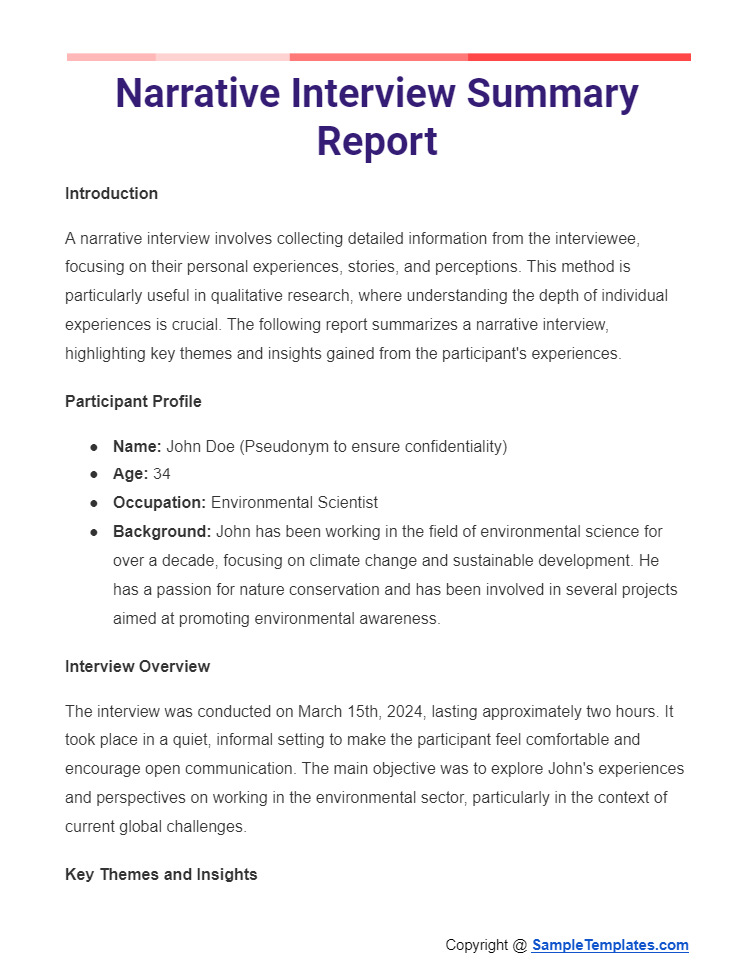
Informational Interview Summary Report
Introduction
The purpose of this report is to summarize the findings from an informational interview conducted with a professional in the field of interest. The interview was aimed at gaining insights into their career path, daily responsibilities, challenges faced in their role, and advice for individuals aspiring to enter the field. This report presents a comprehensive overview of the key takeaways from the interview, providing valuable information for prospective professionals.
Interviewee Profile
- Name: John Doe (Pseudonym)
- Position: Senior Software Engineer
- Company: Tech Innovations Inc.
- Industry: Information Technology
- Years of Experience: 10 years
Key Takeaways
Career Path
John Doe started his career as a junior software developer at a small startup, where he gained hands-on experience in software development and project management. Over the years, he climbed the career ladder through continuous learning and adapting to technological advancements. His journey reflects the importance of resilience and constant skill enhancement in the IT industry.
Daily Responsibilities
- Design and Development: John is responsible for designing and developing scalable software solutions.
- Team Collaboration: He collaborates with cross-functional teams to ensure project alignment with business goals.
- Mentorship: As a senior engineer, he mentors junior team members, fostering a learning environment.
Challenges Faced
One of the main challenges John highlighted is keeping up with the rapidly evolving technology landscape. The necessity to learn new programming languages and tools can be daunting but is essential for career growth. Additionally, managing time effectively between multiple projects and deadlines is a constant challenge.
Advice for Aspiring Professionals
John emphasized the importance of continuous learning and adaptability. He recommended engaging in projects outside of work to gain practical experience and staying updated with industry trends through courses and certifications. Networking with professionals in the field and seeking mentorship can also provide invaluable guidance.
Conclusion
The informational interview with John Doe provided deep insights into the life of a software engineer. It underscored the dynamic nature of the IT industry and the need for professionals to remain adaptable, proactive, and committed to lifelong learning. This report serves as a valuable resource for individuals looking to pursue a career in software engineering, offering a realistic view of the profession’s challenges and rewards.
Recommendations
- Continuous Learning: Aspiring software engineers should focus on building a strong foundation in coding and software development principles, supplemented by continuous learning to keep pace with technological advancements.
- Networking: Building a professional network can provide support, mentorship, and job opportunities in the field.
- Hands-on Experience: Engaging in real-world projects, either independently or through internships, can significantly enhance practical skills and employability.
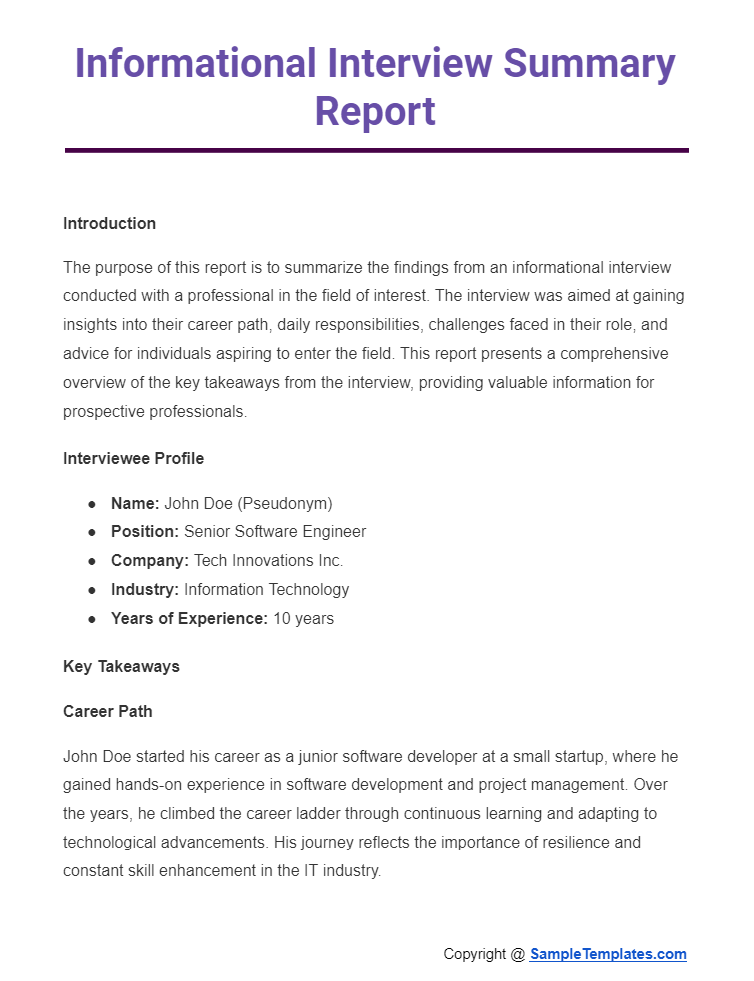
Research Interview Summary Report
In the pursuit of understanding the evolving landscape of digital education, a research interview was conducted with Dr. Emily Stanton, a renowned expert in educational technology. Dr. Stanton has over 15 years of experience in integrating technology into classroom settings to enhance learning outcomes. The interview, held on April 5th, 2024, aimed to delve into the effectiveness of digital tools in education, challenges faced by educators and students, and the future of digital learning.
Dr. Stanton began by emphasizing the significant shift towards digital education, accelerated by the global pandemic. She noted that digital tools have the potential to provide personalized learning experiences, enabling students to learn at their own pace. However, she also highlighted the digital divide as a major challenge, pointing out that not all students have equal access to technology, which can exacerbate educational inequalities.
One of the key themes discussed was the importance of teacher training in the effective use of digital tools. Dr. Stanton observed that while many educators are enthusiastic about incorporating technology into their teaching, a lack of proper training can lead to suboptimal outcomes. She advocated for comprehensive professional development programs to equip teachers with the skills needed to utilize digital tools effectively.
The interview also touched on the role of digital assessment tools in education. Dr. Stanton pointed out that such tools can offer immediate feedback, aiding both students and teachers in the learning process. However, she also cautioned against over-reliance on these tools, emphasizing the need for a balanced approach that includes traditional assessment methods.
Looking towards the future, Dr. Stanton expressed optimism about the role of artificial intelligence (AI) in education. She envisioned AI being used to create more adaptive learning environments that can respond to the needs of individual students. However, she also stressed the importance of ethical considerations and ensuring that AI is used to enhance, rather than replace, the human elements of teaching.
In conclusion, the research interview with Dr. Emily Stanton provided valuable insights into the current state and future prospects of digital education. While digital tools offer exciting opportunities for enhancing learning, challenges such as the digital divide and the need for teacher training must be addressed. The future of digital education, with the potential integration of AI, promises further innovations, provided that ethical and practical considerations are carefully managed. This summary encapsulates the expert perspective of Dr. Stanton, shedding light on the complexities and opportunities within the realm of digital education.
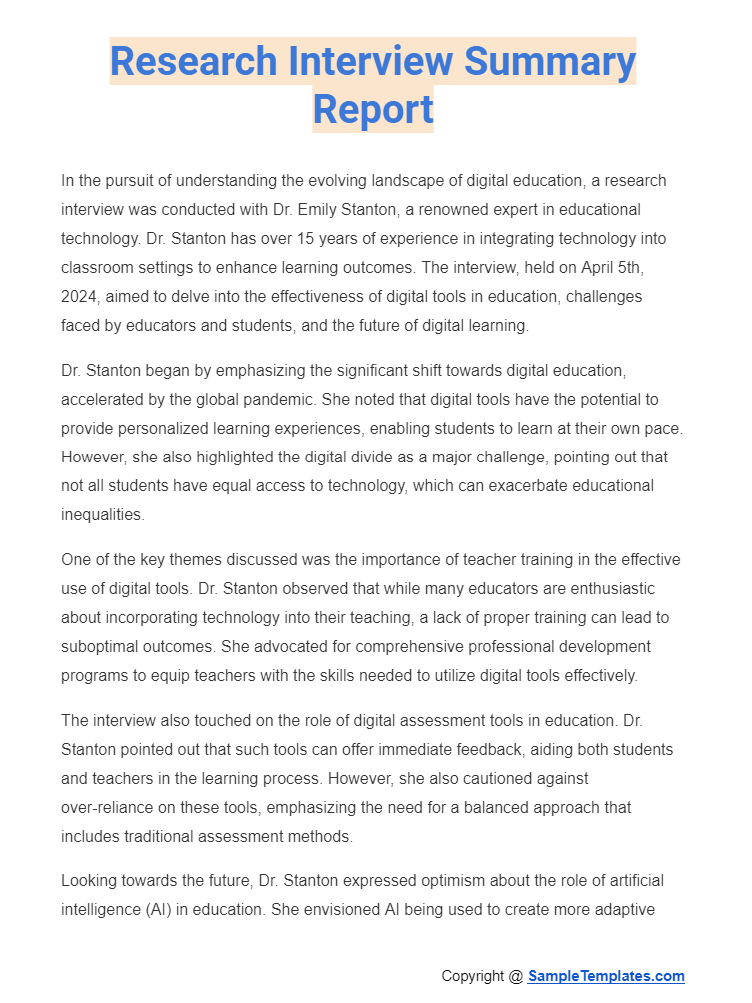
Interview Summary Report For Students
Interview Summary Report: Insights into a Professional Career
In an effort to shed light on the realities of working within a specific industry, an informational interview was conducted with a professional renowned for their expertise and achievements. The interviewee, referred to here as Alex Martin, has carved out a significant career in the field of environmental science over the past 15 years. Currently holding a position as an Environmental Project Manager at Green Solutions Ltd., Alex offered a wealth of knowledge on the educational background, daily tasks, challenges, and personal advice for students contemplating a similar career path.
Alex’s journey into environmental science began with a bachelor’s degree in Environmental Studies, followed by a master’s degree specializing in Sustainable Development. The initial phase of his career was marked by roles that involved extensive fieldwork, data collection, and analysis, laying a solid foundation for his understanding of environmental issues. Over the years, Alex transitioned into project management, where he now leads initiatives aimed at developing sustainable business practices and reducing environmental footprints for large corporations.
A typical day for Alex involves coordinating with team members, stakeholders, and clients to ensure the smooth execution of environmental projects. He emphasized the importance of communication skills in his role, as articulating project goals and outcomes is critical for securing buy-in from various stakeholders. Alex also dedicates time to mentor junior team members, highlighting the role of leadership in fostering a culture of continuous learning and environmental responsibility.
When asked about the challenges faced in his career, Alex pointed to the ever-present issue of balancing economic growth with environmental sustainability. He noted that convincing businesses to adopt sustainable practices can be challenging, especially when immediate benefits are not apparent. Furthermore, staying updated with the latest environmental regulations and sustainability standards requires constant vigilance and adaptability.
For students aspiring to enter the field of environmental science, Alex underscored the importance of a solid educational foundation paired with hands-on experience. He encouraged students to engage in internships and volunteer opportunities related to environmental conservation to gain practical insights and enhance their resumes. Alex also stressed the significance of networking, advising students to connect with professionals and organizations in their field of interest to explore potential career opportunities and gain mentorship.
In conclusion, the interview with Alex Martin provided valuable perspectives on the environmental science profession, from the essential skills and qualifications to the challenges and rewards of working in this field. His advice for students—centered on education, experience, and networking—offers a roadmap for those interested in making a positive impact on the environment through their career choices. This report serves as an informative guide for students, educators, and anyone interested in the environmental science field, encouraging them to pursue their passions with diligence and perseverance.
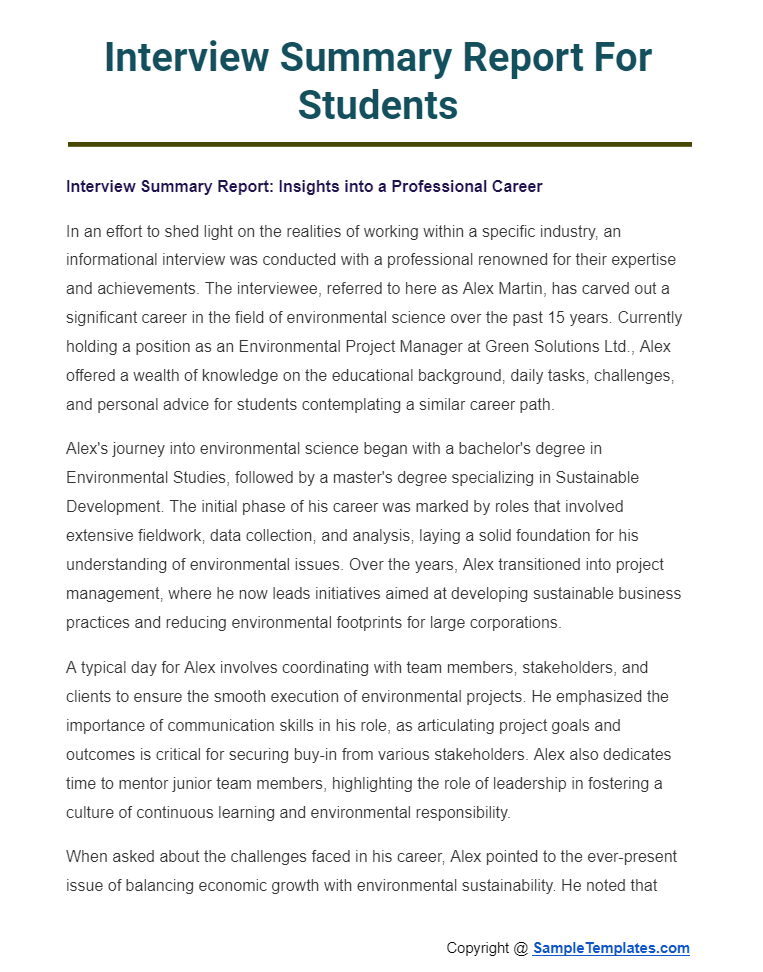
Browse More Templates On Interview Summary Report
Interview Report Sample PDF
Interview Report Template
Tips For Creating Interview Reports
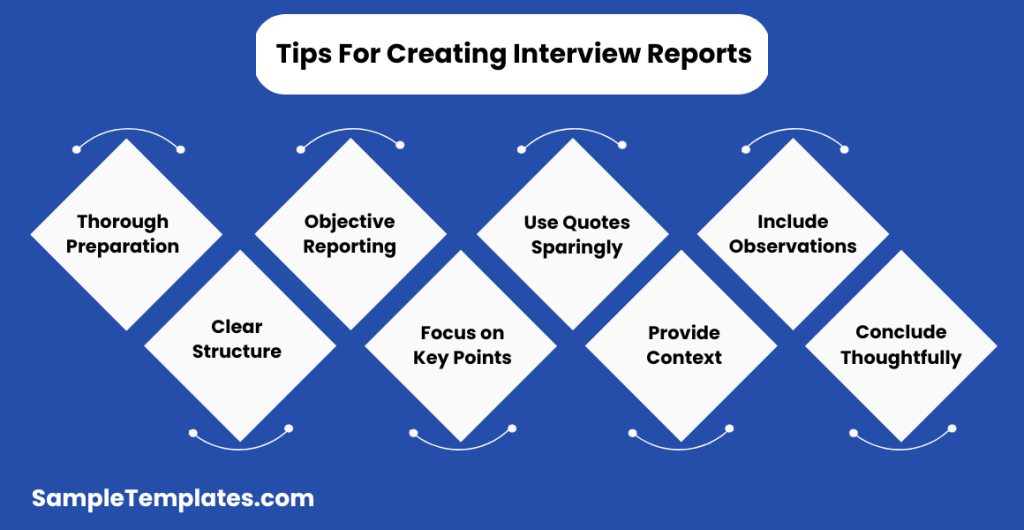
- Prepare Thoroughly: Conduct thorough research on the interviewee, topic, and relevant background information to ensure a comprehensive understanding before the interview.
- Structure Your Report: Organize your report with clear headings such as Introduction, Background, Interview Questions, Responses, and Conclusion for easy readability and navigation.
- Be Objective: Maintain objectivity in your report by presenting the interviewee’s responses accurately and without bias, allowing readers to form their own opinions.
- Focus on Key Points: Highlight key points and significant insights gleaned from the interview, avoiding unnecessary details to keep the report concise and focused.
- Use Direct Quotes Sparingly: Incorporate direct quotes sparingly to support important points or capture the interviewee’s tone accurately, ensuring they add value to the report.
- Provide Context: Offer context for the interview by briefly outlining the purpose, setting, and background information to help readers understand the significance of the conversation.
- Include Observations: Incorporate observations and reflections on the interview process, such as non-verbal cues or notable interactions, to provide additional depth to your report.
- Conclude Thoughtfully: Summarize the main findings and insights from the interview, drawing conclusions or suggesting implications for further research or action as appropriate.
Interview Report Example
Job Interview Report Sample PDF
Importance of Interview Summary Report
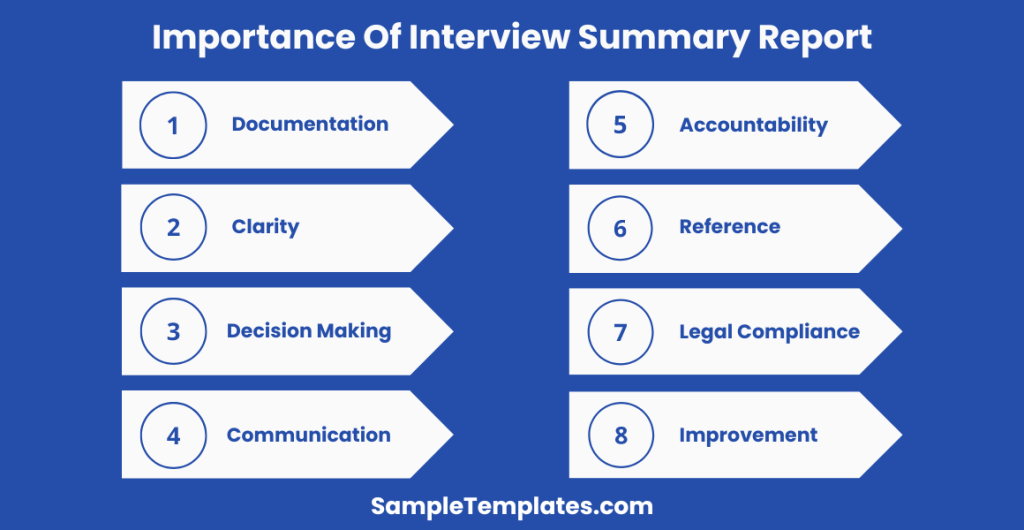
- Documentation: Captures important information discussed during the interview, ensuring key points are recorded accurately for future reference.
- Clarity: Provides a clear overview of the interview process, including main topics covered and outcomes, facilitating understanding among stakeholders.
- Decision Making: Assists in decision-making processes by presenting relevant insights and recommendations derived from the interview.
- Communication: Serves as a communication tool, allowing stakeholders to share interview findings and collaborate on next steps effectively.
- Accountability: Establishes accountability by documenting commitments, action items, and follow-up tasks agreed upon during the interview.
- Reference: Acts as a reference point for reviewing past interviews, tracking progress, and identifying areas for improvement in future interviews.
- Legal Compliance: Ensures compliance with legal and regulatory requirements by documenting interview procedures, outcomes, and any related information.
- Continuous Improvement: Supports continuous improvement efforts by highlighting successes and areas needing attention, fostering ongoing learning and development.
Interview Report Format
How do you summarize an interview candidate?
Summarizing an interview candidate involves capturing key information and insights gained during the interview process. Here’s a structured approach to create a concise and informative candidate summary:
- Introduction: Start with a brief introduction, including the candidate’s name, the position they interviewed for, and the date of the interview.
- Professional Background: Provide a summary of the candidate’s professional background, highlighting relevant work experience, education, and key skills. Mention any certifications or notable achievements.
- Strengths: Identify the candidate’s strengths based on the interview. Highlight specific skills, attributes, or experiences that make them a strong fit for the position.
- Key Competencies: Discuss the candidate’s competencies related to the job requirements. This may include technical skills, interpersonal skills, problem-solving abilities, and other critical competencies.
- Performance in the Interview: Evaluate the candidate’s performance during the interview. Consider their communication skills, enthusiasm, and how well they responded to behavioral and situational questions.
- Cultural Fit: Assess the candidate’s alignment with the company’s culture. Consider factors such as values, teamwork, and adaptability.
- Areas for Development: If applicable, mention any areas where the candidate may need further development. This should be constructive sample feedback related to the role’s requirements.
- Overall Recommendation: Provide an overall recommendation based on the candidate’s fit for the position. Clearly state whether you recommend moving forward with the candidate or not.
- Additional Comments: Include any additional comments or noteworthy observations that could influence the hiring decision.
Interview Summary Report Sample
Example Of An Interview Report
Interview Report Sample
Interview Report Writing Sample
Interview Report PDF
How do I send feedback to HR after interview?
Send concise and constructive feedback to HR after an interview. Express appreciation for the opportunity, highlight the candidate’s strengths, and address any concerns. Be specific about observed skills, cultural fit, and overall impression. Provide actionable insights to assist HR in making informed hiring decisions.
Example of conclusion for interview report
What Is an Interview Summary Report?
Interview is a conversation or a communication between one or more people whose main purpose is to exchange or gather information on a certain topic. Once the interview is over, the conversation between the interviewer and interviewee are then summarize into a report called an interview summary report. Which is a written record of a professional, guided conversation. These interview summary reports may have a number of purposes like it could be to publish articles, for a research project, for school admissions or part of the hiring process. The easiest way to understand a certain individual or topic is to summarize the conversation you had with the interviewee so you may share the experience with others.
How To Write an Interview Summary Report?
Writing an interview summary report is important for a number of reasons such as to record useful and detailed information, provides a searchable record of events, reference for a company in their decision making, combining facts and subjective impressions for the reader and serves as a structure for sample planning the interview. Because of significance that an interview report brings about, it is essential that writing a summary report must be done in a complete and detailed manner as to not miss out any important information. Remember each interview summary report may contain different information depending on the scope of the subject, let us dwell on the basic steps on how to write this summary report.
1. Subject Details
First off, state the subject’s basic details such as their name, position or brief background about who they are and what they do.
2. Introduction or Overview
State the reason behind the interview and why it was conducted. Interviews are conducted since they serve a purpose. Put that purpose into detail or state the nature of the report that has been conducted.
3. Respondent’s Background
You can choose to go into a more in-depth description if your subject matter especially if they define your research or report. You can explain why your chose your subject and how relevant they are to your research or purpose.
4. Goals of the Interview
What do you wish to attain with the whole interview process? Put this into writing to give the readers your own personal intake on the subject matter.
5. Reporting Style
When writing the summary report you may choose to write this portion in narrative style which is a more or less like telling a story or a step by step run through on how you interviewed your subject. Or you cab try the question and answer (Q&A) approach which looks a lot like a script writing containing a faithful reproduction of everything said with clear attributions. Both provide a brief introduction to acquaint the reader with the interviewee, the situation and the interviewer’s impressions.
6. Conclusion and Recommendations
Conclusions are based on the writers point of view and what he or she has learned or gained from the subject. Sample Recommendations are often included for those conducting the interviews as part of a job hiring process, academic admissions or perhaps based on a research findings.
How to Summarize an Interview
To summarize an interview effectively, follow these steps:
- Identify Key Themes: Pinpoint the central topics and recurring themes discussed during the interview. This forms the foundation of your summary.
- Select Key Quotes and Insights: Highlight notable quotes and valuable insights provided by the interviewee. Choose sample statements that best capture the essence of the discussion.
- Organize Chronologically or Thematically: Structure your summary in a logical order, either following the chronological flow of the interview or organizing it by key themes and topics.
- Eliminate Redundancies: Avoid unnecessary repetition and remove extraneous details. Focus on the most critical information to maintain conciseness.
- Maintain Objectivity: Present the interviewee’s views objectively, refraining from personal bias. Ensure your summary accurately reflects the interviewee’s perspectives.
- Highlight Surprising or Significant Points: Include any unexpected revelations or particularly impactful statements that emerged during the interview.
- Conclude with Key Takeaways: Summarize the overall significance of the interview, emphasizing key takeaways and insights. This provides a clear conclusion for your audience.
By following these steps, you can craft a concise yet comprehensive summary that effectively communicates the essential elements of the interview.
FAQs
1. What Can Be Use to Record Interviews?
Aside from a sample paper or pen, you can use a dictation machine or cell phone can record longer interviews for transcription afterward.
2. How Do You Ask For Permission in an Interview?
Through a formal email or sample letter stating your purpose, explain how you found your respondent and acknowledge any accomplishments if this is relevant to the purpose of your interview.
3. What Is an Informational Interview?
This is is a sample brief conversation between a person who wants to investigate a career and a person working in that career. The purpose of an informational interview is not to get a job. Instead, the goal is to find out about jobs you might like-to see if they fit your interests and personality.
4. How To Write an Interview Report
To compose an interview report, succinctly document key discussion points, interviewee responses, and insights gained. Maintain clarity, objectivity, and organization in presenting findings for a comprehensive overview.
5. What is an Interview Summary Essay?
An interview summary essay condenses a conversation into a written form, highlighting key points, insights, and perspectives discussed during the interview in a concise and organized manner.
6. What is a quick summary for a job interview?
A job interview summary is a brief overview outlining the candidate’s qualifications, responses to key questions, and overall suitability for the position, aiding employers in decision-making.
7. What is a good summary report?
A good summary report succinctly presents essential information, key findings, and insights from a broader document or study, providing a clear and concise overview for quick understanding.
In conclusion, make sure to always go over your interview summary report, ensure that you stay true to the details you have collected through out the interview process. One can be objective or subjective depending on the subject matter or relevance of your research. But overall, make it as detailed and accurate as possible since the information in your report may serve a higher purpose on its relevant field.
Related Posts
FREE 15+ Sample Evaluation Reports
FREE 11+ Complaint Investigation Report Samples
FREE 10+ Sample Exit Interview Forms
FREE 9+ Sample Technical Assessment
FREE 8+ Investigation Summary Report Samples
FREE 6+ Sample Interview Assessment Forms
FREE 6+ Exit Interview Forms Samples
FREE 5+ Sample Chapter Summary
FREE 5+ Sample Job Fair Report
FREE 15+ Sample Outline
FREE 12+ Case Study Summary Samples
FREE 10+ Psychological Assessment Report Samples
FREE 10+ Sample Executive Report
FREE 10+ Management Research Report Samples
FREE 10+ Appraisal Report Samples
